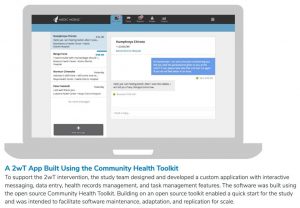Voluntary medical male circumcision (VMMC) is considered safe and the vast majority of men heal without complication. However, guidelines require multiple follow-up visits, which can burden staff and facilities with clients who are typically healing well. With funding from the National Institutes of Health (NIH), ZAZIC recently conducted a prospective randomized control trial (RCT) to determine if two-way texting (2wT) was as safe as routine post-operative visits and if it reduced workload in two high-volume VMMC sites near Harare, Zimbabwe.

Both clients and providers felt satisfied with the 2wT system and felt it could be ready for scale. Many clients reported feeling confident, comfortable, satisfied, and safe with text follow-up. Importantly, clients felt that 2wT saved them time and money. Providers also noted 2wT saved them time, empowered their clients to engage in the healing process, and addressed gaps in MC service quality.
The results strongly suggest that 2wT is highly usable and acceptable for providers and patients. Men with concerns appeared confident and comfortable to receive guidance via text and providers noted that men engaged proactively in their healing.
It was recommended in the study that 2wT between providers and patients should be considered for future adaptation in other short-term care contexts. 2wT also appears far less expensive than active follow-up to improve patient safety: on average, post-VMMC follow-up under 2wT was $0.098 compared to $0.955 under routine care. 2wT was both less costly and more effective in identifying AEs relative to the expected rate of AEs. As such, I-TECH aims to scale 2wT in further testing among rural clients and guardians to improve patient care at lower cost.
The trial is registered on ClinicalTrials.gov, trial NCT03119337, and activated on April 18, 2017. https://clinicaltrials.gov/ct2/show/NCT03119337. This RCT was supported by the Fogarty International Center of the National Institutes of Health under Award Number R21TW010583.